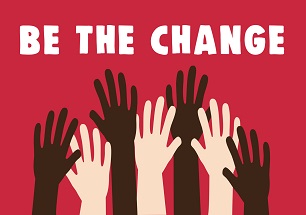Race, Ethnicity, Culture, and Discrimination:
Key support, resources and information

Each year St Andrews is home to staff and students of diverse ethnicities and backgrounds. The University of St Andrews is committed to creating a culture of inclusivity, diversity, and equity for all staff and students. We will not tolerate any form of racism or discrimination. We aim to foster an environment where diversity is celebrated within the University and racial, ethnic, and cultural differences are looked at with respect and sensitivity. By facilitating inclusivity and providing essential support to our diverse staff and student population, we can strive to embed good practice that contributes towards equity for all within and beyond University.
This following link will outline key information and resources for support, and signposting to student-led or external resources in the areas of Race, Ethnicity, Culture, and Discrimination. If you have experienced any instance of racism, hate, microaggressions or discrimination and would like further details on how to access support, or guidance on how you can report to the University, please see Report and Support
I’m not sure what I can report or seek support for?
At your time in St Andrews, you can report or seek support for a range of issues which are linked with race, colour, ethnicity and religion. These include, but are not limited to experiencing racial discrimination, racial microaggressions and hate crime.
Sometimes experiences can be difficult to articulate, and we may not be sure of exactly what to seek support for; please always feel welcome to seek guidance or support by booking in with us. To contact the Advice and Support Centre, you can call +44 (0)1334 46 2020 or complete this online form. During a consultation, our advisers will listen and work collaboratively with you to offer options, information or to identify further support suited to your needs.
What is race discrimination?
Race discrimination can be Direct – that is, conscious and arising out of a dislike for a particular race. It can also be Indirect – where we may not always register our presuppositions or biases towards others and our ways and means, individually or institutionally put other races at a disadvantage.
Resources
What are racial microaggressions?
Racial microaggressions are small events or acts of aggression (verbal and non-verbal) towards a person of a different race. These may be conscious or unconscious and may seem small to the perpetrator or non-impacted bystanders, but whether in isolation or combined they impact the experience of the person(s) towards which the comment was directed or witnesses, particularly those sharing racial characteristics. The impacts can range from upsetting others momentarily to affecting them deeply over a period. Accumulatively, microaggressions can make ‘minoritised’ groups feel as though they do not ‘belong’ within an institution.
Some examples of racial microaggressions include “Your English is so good” and “Where are you really from?”.
What is White Privilege?
The Merriam-Webster dictionary defines white privilege as “the set of social and economic advantages that white people have by virtue of their race in a culture characterized by racial inequality”. It may not always be consciously used or an obviously visible privilege but is very often the lack of obstacles for one race when compared with another. White privilege can be noted often in the assumptions and expectations that people make about other people of a given race. Most recently the concept was highlighted in the Black Lives Matter movement following the murder of George Floyd at the hands of the police. What the movement did was also to encourage thinking in ways, that this privilege can be used by white people to strengthen the cause of equity for all. Here are some resources to understand what white privilege is and how it can be used to positively impact the society and end discrimination through allyship.
How can I be an ally?
How can I report an incident of hate, discrimination or racism?
- Call 999 when the situation may be an emergency, or in the event of a crime.
- Report a concern or issue to the University via Report and Support
- Police Scotland
- Reporting anonymously to CrimeStoppers
- Out of hours: Security and Response team
How can I access University support?
What external resources are available to me?
- Black, African and Asian Therapy Network (BAATN)
- Muslim Youth Helpline
- Rethink Mental Illness
- Student minds
- Victim Support Scotland
- BOLOH FOR Covid-19: Covid-19 helpline and webchat for those 11+ Black, Asian or Minority Ethnic child, young person, parent, or carer, affected by Covid-19.
- Support line
- Tarakki
- Karma Nirvana
- St Andrews Nightline
What peer support and resources do I have access to?
Subcommittees
Societies
- Afro-Caribbean
- Chinese Students and Scholars
- Chinese Hongpao
- St Andrews Malaysian International Group (SMIG)
- Hong Kong Society
- The Japan Society
- St Andrews Muslim Student Association (STAMSA)
- Filipino Society
- Middle East and North Africa Society
- Russian Society
- Singapore Society
- South African Society
- Thai Society
